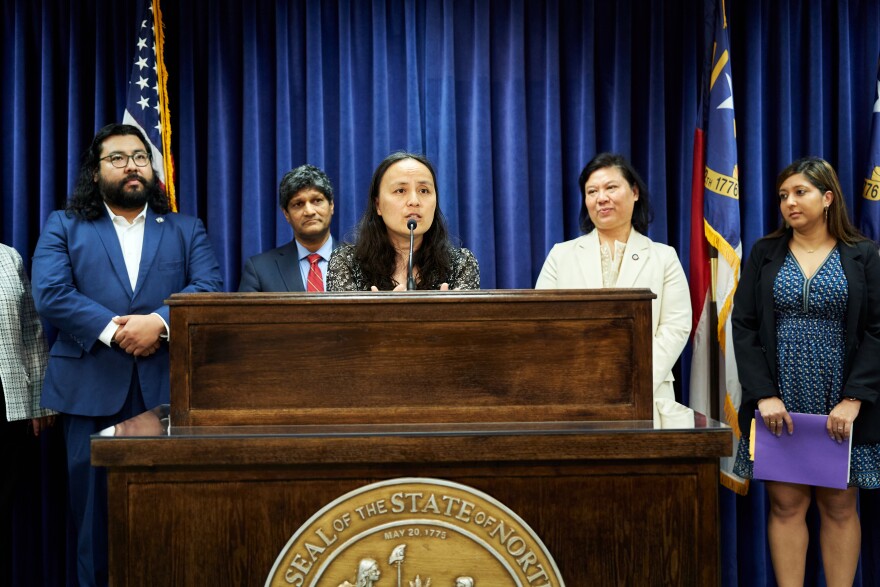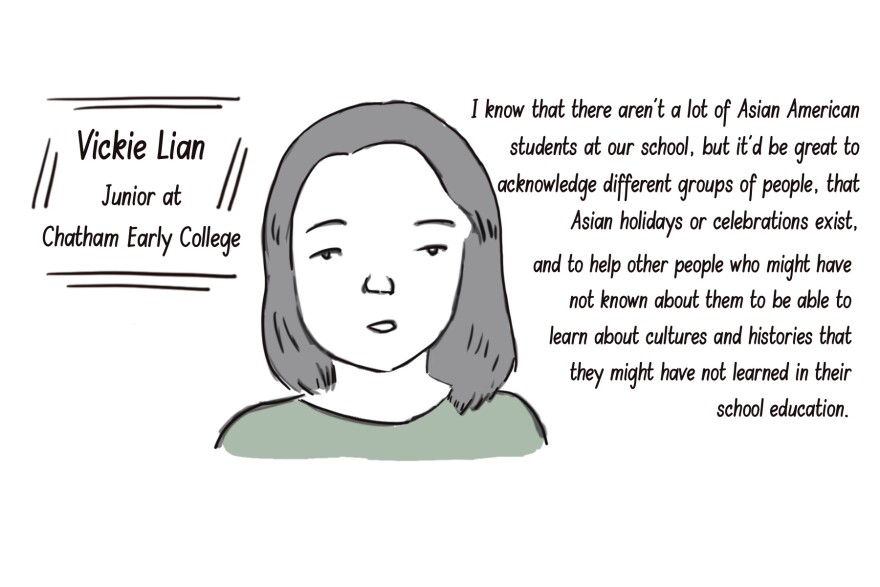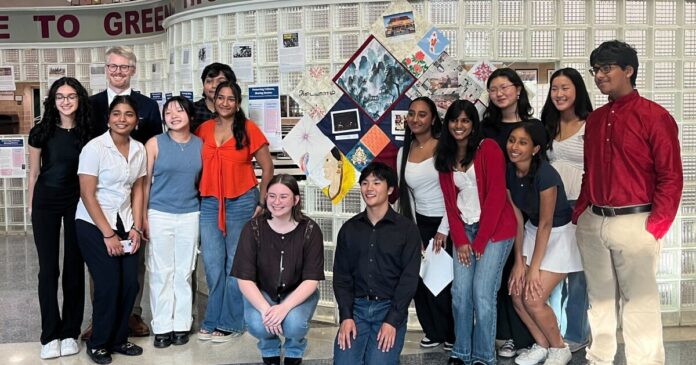On the evening of April 28, the lobby of Green Hope High School in Cary filled with the hum and chatter of more than a dozen high school students. They served paper cups of chai, taped posters and artwork to a curved glass wall in the middle of the floor, and talked with adults excitedly about their project: Oral histories they recorded with Asian Americans in their community.
Senior Dianhao Li, co-president of Green Hope High’s Asian American Oral History Project, said his favorite interview was with a Chinese clergyman who serves at the church that he attended as a kid. Through that conversation, he learned how Chinese churches formed and how such places can become a haven for Asian immigrants adjusting to a new country and culture.
“My mom took me to Chinese church, so I was very much immersed in that sort of community and that’s what made me want to join this project in the first place,” said Li, 18. “I felt like I had a lot of these stories I wanted to share, and I knew I could interview people and share their stories.”
The project’s become so successful that it paved the way for Green Hope High to pilot an Asian American studies elective for the Wake County Public Schools System this fall.
Junior Anandhi Selvaraju expressed that she was beyond excited to find out she was among the more than 90 students who had signed up for the elective next semester.
“It makes me happy because people actually wanna learn about how me and like my ancestors came to be where we are today,” said Selvaraju, 17. “When you look around RTP, you see so many Asian Americans, and we make up so much of the population here, and you can tell that we have a backbone in how the economy and society has come to be what it is today.”
Green Hope High’s AAPI oral history project
Since 2010, the Asian population of North Carolina has grown by 68% and young people make up a significant portion of that group. In the town of Cary, Asian residents recently climbed to more than 20% of the population. Green Hope High teacher Colin Richardson saw that firsthand, having graduated from the school in 2006.
“When I graduated from Green Hope, it was 6% Asian American and when I came back, it was 20% and now it’s 38%,” he said.
Richardson, who in 2024 was named North Carolina History Teacher of the Year, said the effort to give students opportunities to learn Asian American history was the result of many conversations about needing to increase representation in the curriculum. Wake County Public Schools offers high schoolers the choice of African American studies and American Indian studies electives, but until recently, Asian American studies has not been an option. None of the district’s schools teaches Latin American studies, even though they are technically approved to offer that elective – whether an elective is taught depends on the willingness of individual schools and teachers to pursue it.
These electives would not count as required history credits, which for WCPSS are: World History, Civic Literacy, American History, and Economics and Personal Finance.
“When I graduated from Green Hope, it was 6% Asian American and when I came back, it was 20% and now it’s 38%.” — Colin Richardson, history teacher at Green Hope High School in Cary
Leading up to the creation of the oral history project, Richardson cited former student Shania Khoo as a major influence – Khoo fought to have Asian American studies taught at Duke University. Another student, who became a Morehead Cain scholar, helped him acquire a grant to launch the Asian American oral history project.

In the project’s first year, in 2024, they not only recorded oral histories, but also partnered with the school’s librarians to design an Asian Pacific Islander exhibit, worked with the chorus director to perform more works by Asian American composers and organized an Asian American heritage concert with the orchestra director. This year, the students have been creating a temporary mural based on their oral histories.
“I feel like I’ve learned a lot about my community,” Richardson said. “I’ve also learned a lot about how to lead students when you don’t have the motivator of grades or anything like that. I tell the students all the time – I can help you, I can point you in the right direction, but ultimately, if we have any oral histories at the end of this, it’s because you cared enough to make it happen.”
Stalled efforts to mandate AAPI history in North Carolina
Especially after the rise of anti-Asian hate crimes during the COVID-19 pandemic, AAPI history has increasingly been included in K-12 curriculum across the country, with the hopes of fostering a greater sense of belonging for Asian diaspora communities and combating harmful racial stereotypes. Asian American organizations and advocates pushed for state mandates to have it taught as a part of U.S. history in public schools, which have been approved in several states, Illinois, New Jersey, Wisconsin, Connecticut, Florida and Delaware.
“It really shouldn’t be about the number of Asian American students in the school,” said Heidi Kim, director of the UNC-Chapel Hill Asian American Center. “In many states, there have been groups looking for statewide mandates so that it’s not dependent on a particular school district or on a concentration of population for there to be this kind of content in the curriculum.”
“Many of those efforts have been successful,” Kim added, “but more recently, there’s been a kind of stalling out and backlash. So I’m not sure what the future holds in terms of these kinds of statewide legislative measures.”
In North Carolina, that stalling has happened. State lawmakers first introduced a bill to mandate the inclusion of AAPI history in courses taught at public schools in 2023, following the election of the state’s first female Asian American legislators, Rep. Ya Liu and Maria Cervania of Wake County, and the creation of the legislature’s AAPI Caucus. The bill had bipartisan support, but it did not make it out of the rules committee.
A second attempt to pass a bill occurred this spring, but it also did not make the legislative crossover deadline this month, along with a bill to form an AAPI heritage commission.
“We’ll continue to push this bill until it becomes law of land in our state,” said Rep. Ya Liu at a May 7 press conference.
The current rollbacks of diversity, equity, and inclusion initiatives on the federal and state levels have added to the challenges to advocate not only for Asian American studies, but ethnic studies generally, said Shruti Parikh, head of education and political engagement at North Carolina Asian Americans Together.
“It’s making it difficult to have conversations with people because if you bring up the wrong word, you’re labeled as a DEI bill and the conversation is pretty much shut down,” Parkikh said.
However, Parikh said that even if a statewide mandate were to pass, schools and community members at the local level would still have to figure out how to implement Asian American history into the curriculum. Her organization advocates for an approach that helps people see the complex roles and relationships that Asian Americans have had with other racial and ethnic groups, such as the alliance with Black activists during the Civil Rights era.
“We can’t just focus on contributions,” Parikh said. “We have to focus on the good and bad. That’s the makeup of any community.”

How students are driving change at their schools
At Chatham Early College, junior Vickie Lian decided last year to reach out to California nonprofit Teach AAPI for help in forming an Asian American affinity group.
“I was getting really interested in trying to connect more with the Asian community since I was kind of realizing that I didn’t know much about my culture or the broader community,” she said.
Lian’s family is one of very few Asian families in Siler City. Her parents work at a Chinese restaurant, where Lian occasionally helps out. In her spare time, she makes art and writes short stories about her heritage.

The recently formed AAPI affinity group at Chatham Early College has less than five students who attend regular meetings to discuss topics including Asian Pacific Islander representation in sports and the model minority myth, which are outlined in Teach AAPI’s affinity group toolkit. Teach AAPI co-founder Renee Yang said the organization is taking a gradual approach to their partnership with Chatham County Schools.
“In our initial conversation with Chatham County, it was really focused on affinity groups because they have a big population of Asian Pacific Islander students,” Yang said. “I think the affinity group is a very good first step. It gives (students) the courage and empowerment to continue to ask for more in the future.”
Ideally from there, Yang said the organization would continue to offer schools more resources. Teach AAPI, which largely operates in California, has partnerships with 33 schools across the country and recently launched an “educator circle” program to work with teachers beyond their partnerships.
“I was getting really interested in trying to connect more with the Asian community since I was kind of realizing that I didn’t know much about my culture or the broader community.” — Vickie Lian, student at Chatham Early College and Siler City resident
Next semester, Lian hopes to encourage more students to join the affinity group, even if they don’t identify as Asian American.
“I want to make sure that the group helps people better understand the community and also Asian American culture because there wasn’t like a lot of ways for people to learn more about it if they weren’t looking for it exactly,” she said.
Meanwhile, at Green Hope High’s oral history showcase, Umadevi Ramasamy showed up to support her 17-year-old daughter, Karuna Shanmugam. Shanmugam, along with her classmates Angelina Lu and Avril Yan, crafted a tapestry that explores the complex feelings and connections they and others feel regarding their Asian heritage.
“Appreciation comes only if you know your roots,” Ramasamy said. “(Immigrants) are definitely overlooked in many aspects but that doesn’t make us any less. We may be overlooked now, but the next generation will not do that. That is why it’s very important they learn about themselves and others.”
Are you a teacher or student at a North Carolina school who’s working on trying to include AAPI history into your curriculum? We’d love to hear from you. Please reach out to Eli Chen at elichen@wunc.org.

